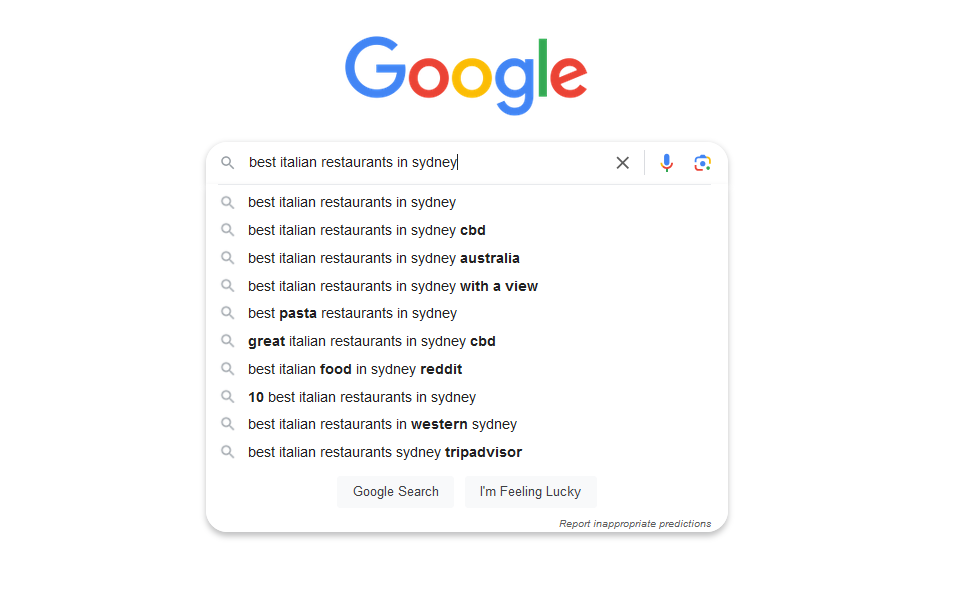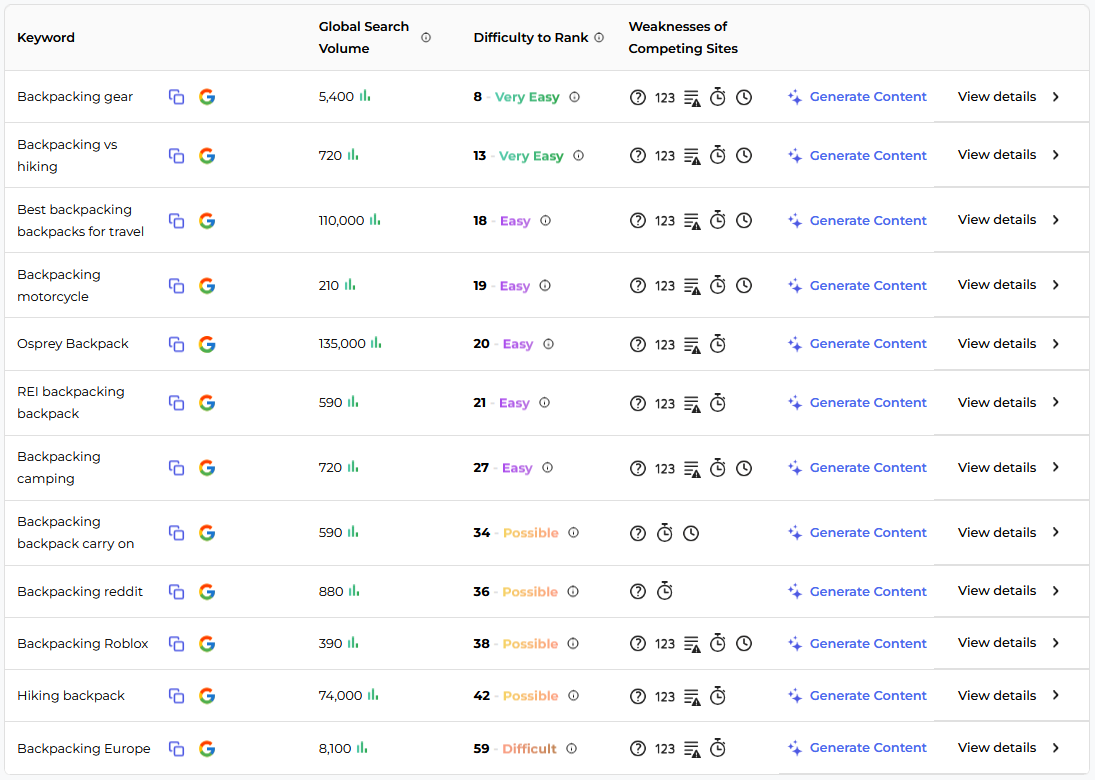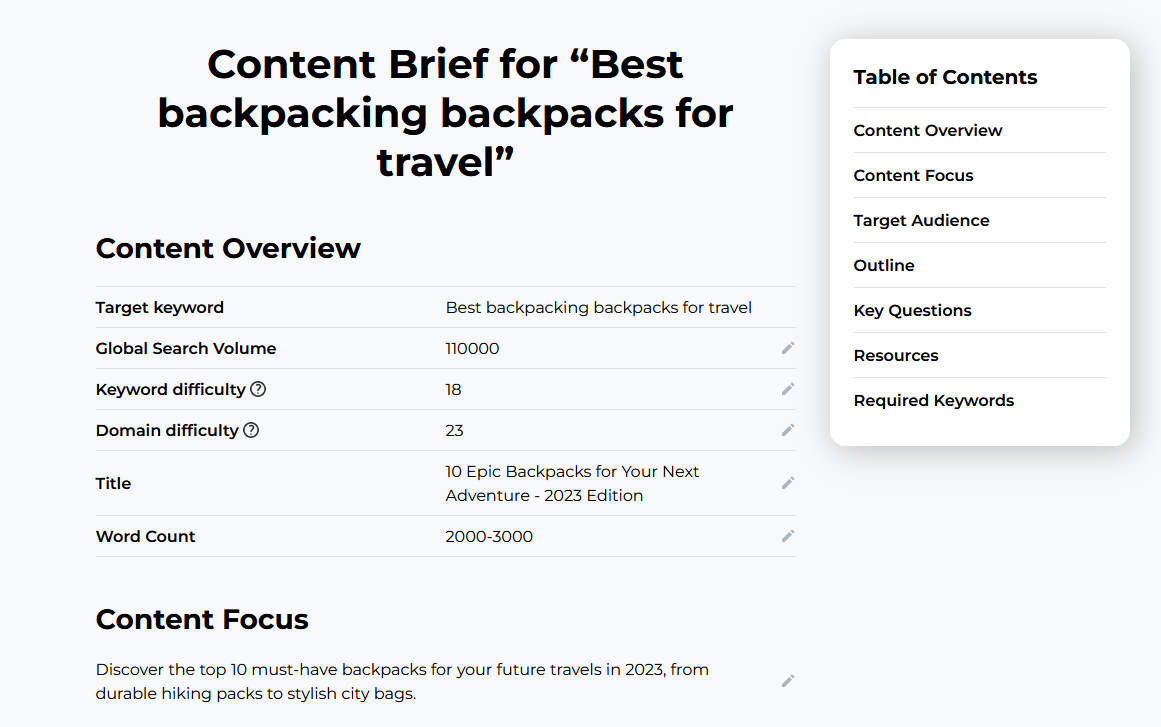
This article does not need much of an introduction, let’s get into it…
Can SEO Keywords Be Phrases?
Yes, SEO keywords can be phrases. In fact, phrases are often more effective than single keywords at targeting specific search intent. For instance, “best hiking trails in Colorado” provides clearer intent than just “hiking,” helping search engines match your content to users actively seeking that information.
Why Are Keyword Phrases Better?
- More Relevant Matching: Phrases narrow down search intent, ensuring your content meets user expectations more precisely.
- Easier to Rank: Long-tail phrases typically face less competition than broad, single-word keywords, giving smaller websites an opportunity to rank well.
- Targeted Traffic: Phrases attract visitors who are further along in the decision-making process, improving engagement and conversion rates.
How to Use Keyword Phrases Effectively:
- In Titles and Headings: Use keyword phrases naturally in your titles. For example, “Top 5 Hiking Trails in Colorado to Explore This Summer” aligns with what users search for.
- Within the First 100 Words: Search engines prioritize early content, so mention phrases upfront: “If you’re looking for the best hiking trails in Colorado, we’ve got you covered.”
- Throughout Subheadings and Body Content: Break content into sections using relevant phrases. A subheading like “Family-Friendly Hiking Trails in Colorado” targets specific searches.
- Create Diverse Content: Incorporate phrases across blog posts, FAQs, and guides to cover different types of user queries. For example, “What are the best dog-friendly hiking trails in Colorado?” appeals to pet owners.
- Optimize Meta Descriptions: Include keyword phrases in meta descriptions to improve click-through rates: “Discover the top hiking trails in Colorado with scenic views and easy paths for all skill levels.”
Using SEO keyword phrases allows you to align content with user intent, attract more qualified traffic, and boost your chances of ranking higher in search results.
In this article we’ll explain what keyword phrases are in SEO, how they differ from short-tail keywords, and how using them can help you better match user intent and rank higher in SERPs.
Ready? Let’s roll…
What is a Keyword Phrase in SEO?
A keyword phrase in SEO is a multi-word query that targets specific search intent. These phrases, also called long-tail keywords, help search engines understand your content better and match it to user needs.
For example, “easy vegan dinner recipes” provides clearer intent than “recipes.” Keyword phrases face less competition, attract more relevant traffic, and improve your chances of ranking higher and driving conversions.
SEO keyword phrases are what people commonly use when searching for information, products, or services online. These phrases are more specific than broad, single-word keywords and often indicate a clearer search intent.
By targeting keyword phrases relevant to your business, you can attract more qualified traffic to your website.
Examples of SEO Keyword Phrases
Keyword phrases offer more precise targeting, face less competition, and improve engagement by matching user intent better than single keywords.
Here’s a concise comparison of single keywords vs. keyword phrases, with examples and their benefits:
Food & Recipes
- Keyword: “Snacks”
- Keyword Phrase: “Healthy snacks for weight loss”
- Benefit: Targets a niche audience with clear intent, attracting more qualified traffic.
Travel & Tourism
- Keyword: “Hotels”
- Keyword Phrase: “Affordable hotels in New York”
- Benefit: Captures users closer to booking, increasing the chance of conversions.
E-commerce
- Keyword: “Shoes”
- Keyword Phrase: “Best running shoes for flat feet”
- Benefit: Reduces competition and improves relevance for niche buyers.
Technology
- Keyword: “Laptop”
- Keyword Phrase: “Best laptops for video editing under $1500”
- Benefit: Matches specific user needs, improving click-through and engagement.
Health & Fitness
- Keyword: “Yoga”
- Keyword Phrase: “Yoga poses for back pain relief”
- Benefit: Helps rank for intent-rich searches, increasing user engagement and retention.
Notice how these phrases contain multiple words and are more descriptive than a single keyword like “restaurants” or “rabbits.” They provide context and specificity, helping search engines understand the content’s relevance to the user’s query.
Types of SEO Keyword Phrases
Each type of SEO keyword phrase targets specific user intents, helping you attract the right audience.
Let’s explore various types of keyword phrases —short-tail, long-tail, transactional, informational, local, branded, and question-based—along with examples and benefits of how a SEO phrase benefits the audience more vs. single keywords.
- Short-Tail Keyword Phrases (2-3 Words)
- Single Keyword: “shoes”
- Keyword Phrase: “men’s running shoes”
- Benefit: Broad reach but highly competitive, good for general brand awareness.
- Long-Tail Keyword Phrases (4+ Words)
- Single keyword: “laptops”
- Phrase: “best laptops for video editing under $1500”
- Benefit: More specific, lower competition, and higher chance of conversion.
- Transactional Keyword Phrases
- Single keyword: “headphones”
- Keyword Phrase: “buy noise-canceling headphones online”
- Benefit: Targets users ready to buy, increasing conversion potential.
- Informational Keyword Phrases
- Single keyword: “clean shoes”
- Phrase: “how to clean leather shoes”
- Benefit: Captures users seeking guidance, building authority and trust.
- Local Keyword Phrases
- Single Keyword: “restaurants”
- Keyword Phrase: “best Mexican restaurants in Chicago”
- Benefit: Attracts local customers, driving foot traffic and local SEO performance.
- Branded Keyword Phrases
- Single Keyword: “Nike”
- Keyword Phrase: “Nike Air Max 90 review”
- Benefit: Draws users already familiar with the brand, leading to better engagement.
- Question-Based Keyword Phrases
- Single Keyword: “learn Spanish”
- Keyword Phrase: “what is the best way to learn Spanish?”
- Benefit: Helps target featured snippets, boosting visibility and organic traffic.
These examples show how various keyword phrases align with user intent, making them more effective for targeted traffic, conversions, and SEO rankings.
Benefits of Using SEO Keyword Phrases
Target Specific Search Intent
When you use keyword phrases in your content, you can attract qualified traffic that is searching for exactly what you offer. These visitors are more likely to engage with your website because the content directly addresses their specific needs or questions.
For example, if someone searches for “best Italian restaurants in Sydney,” and your article targets that exact phrase, the user will find your content highly relevant and valuable.
Less Competition
Targeting keyword phrases can help you rank higher in search results compared to focusing on broad, single-word keywords. Because phrases are more specific, they are often less competitive.
This means that even if your website is relatively new or has a lower domain authority, you can still have a good chance of ranking well for targeted keyword phrases.
Higher Conversion Potential
When searchers use specific keyword phrases, they are typically further along in the buying journey or have a clearer idea of what they want. By targeting these phrases in your content, you attract visitors who are more likely to convert into customers or take desired actions on your site.
For instance, someone searching for “affordable laptops for college students” is probably ready to make a purchase, so if your content targets this phrase and provides helpful information, the visitor is more likely to buy from you.
How to Find the Best SEO Keyword Phrases
To identify the most effective SEO keyword phrases for your website, start by analyzing your existing rankings. Tools like Google Search Console provide valuable insights into which phrases are already driving traffic to your site. This information helps you understand what’s working well and where there may be room for improvement.
Next, research your competitors’ keywords to uncover valuable opportunities you might be missing. SERP analysis tools allow you to see which phrases your competitors are ranking for, giving you ideas for new content or areas to optimize.
Keyword research tools are another excellent resource for finding the best SEO keyword phrases. Platforms like TopicRanker can generate keyword ideas based on seed keywords related to your business or industry.
These tools provide data on search volume, competition level, and related phrases, helping you identify high-potential keywords to target.
When using keyword research tools, look for phrases with a good balance of search volume and competition. You want to target keywords that have enough search volume to drive meaningful traffic but not so much competition that it’s difficult to rank for them.
Long-tail keyword phrases are often a good bet, as they tend to have lower competition but still attract qualified traffic.
As you build your list of target keyword phrases, consider grouping them into themes or topic clusters. This approach helps you create a more cohesive and comprehensive content strategy, making it easier for search engines to understand your website’s structure and relevance to specific topics.
How to Optimize Your Website for SEO Keyword Phrases
Once you’ve identified the best SEO keyword phrases for your website, it’s time to optimize your content to rank higher in search results. Here are some effective strategies to incorporate keyword phrases into your site:
Include Phrases in Key On-Page Elements
Weave your target keyword phrases naturally into important on-page elements such as page titles, headings (H1, H2, etc.), body copy, and meta descriptions. This helps search engines understand the main focus of your content and its relevance to specific search queries.
However, avoid overusing or forcing phrases where they don’t belong, as this can be seen as keyword stuffing and may harm your rankings.
When crafting your page titles and meta descriptions, aim to create compelling, click-worthy snippets that entice users to visit your site.
Create Dedicated Landing Pages
If you have high-value keyword phrases that warrant their own content, consider building dedicated landing pages optimized around those specific phrases. These pages should provide in-depth, relevant information that directly addresses the user’s search intent.
By creating targeted landing pages, you can improve your chances of ranking for those specific keyword phrases and attracting qualified traffic to your site.
When designing your landing pages, focus on creating a clear, user-friendly experience that guides visitors towards your desired action, whether that’s making a purchase, filling out a form, or contacting your business.
These landing page best practices can help you create effective, high-converting pages optimized for your target keyword phrases.
Develop Keyword-Focused Blog Content
Blogging is a powerful way to target question-based queries and topics related to your business or industry. By creating in-depth, informative blog posts optimized around specific keyword phrases, you can attract organic traffic and establish your website as a valuable resource in your niche.
When developing your blog content strategy, research the questions and topics your target audience is searching for. Then, create comprehensive posts that provide helpful, actionable information related to those queries. As you write, naturally incorporate your target keyword phrases into the post’s title, headings, and body copy.
In addition to targeting specific phrases, aim to create content that is engaging, easy to read, and visually appealing. Break up long paragraphs with subheadings, bullet points, and images to improve readability and keep visitors on your page longer.
As you optimize your website for SEO keyword phrases, remember that the ultimate goal is to provide value to your target audience. Focus on creating high-quality, relevant content that addresses user needs and incorporates your target phrases naturally.
Combining keyword optimization with a user-centric approach can improve your search rankings, attract qualified traffic, and ultimately grow your business online.
SEO Keyword Phrase Best Practices
When optimizing your website content for search engines, it’s important to follow a few best practices to ensure you’re effectively targeting the right keyword phrases.
Prioritize Relevance Over Search Volume
While it may be tempting to chase after high-volume, broad keywords, it’s more beneficial to focus on phrases that best match what you offer. These targeted phrases may have lower search volumes, but they attract users who are more likely to engage with your content and convert into customers.
Identifying your buyer personas can help you understand the specific language and phrases your target audience uses when searching for your products or services.
Use Keyword Variations
Don’t limit yourself to exact match keywords. Search engines have evolved to understand the intent behind queries, so optimizing for related phrases and synonyms can help you capture a wider range of relevant traffic.
Balance Keyword Usage with Readability
While incorporating keyword phrases into your content is important for SEO, overusing them can hurt your rankings and user experience. Avoid keyword stuffing and focus on writing for users first, naturally weaving keywords into your content.
Google’s Search Quality Rater Guidelines emphasize the importance of creating high-quality, readable content that satisfies user intent.
As you implement these best practices, remember that SEO is an ongoing process. Regularly monitor your keyword performance using tools like Google Search Console and adjust your strategy as needed. Stay up-to-date with the latest SEO trends and algorithm updates to ensure your keyword targeting remains effective over time.
What are the Most Effective SEO Keyword Phrases?
The most effective SEO keyword phrases vary depending on your unique business, products or services, and target audience. What works well for one company may not be the best fit for another.
You need to conduct thorough research and analysis to identify the keyword phrases that will drive the most qualified traffic and conversions for your website.
Start by studying your competitors’ keyword strategies. Tools like Ahrefs, SEMrush, and SpyFu allow you to see which phrases your competitors are ranking for and how much traffic those keywords generate. This helps you uncover valuable opportunities you may be missing out on and identifies areas where you can differentiate your content.
Next, dive into keyword research to gather data on search volume, competition level, and related phrases. Google Keyword Planner is a free tool that provides insights into how often certain words and phrases are searched and how those searches have changed over time, but is more focused on keywords for paid search ads instead of organic results.
Paid tools like TopicRanker offer even more detailed data and suggestions for long-tail keyword variations.
As you analyze keyword data, consider the search intent behind each phrase. The most effective keyword phrases are those that align with the goals and needs of your target audience at different stages of the buyer journey.
For example, someone searching for “what is SEO” is likely looking for informational content, while someone searching for “best SEO agency in New York” is probably closer to making a purchase decision.
Creating content that matches search intent improves the relevance and value of your pages in the eyes of both users and search engines. When your content delivers on the promise of your keyword phrases, you’re more likely to earn higher rankings, engagement, and conversions.
It’s also important to consider the competitiveness of different keyword phrases. High-volume, broad keywords like “SEO services” may be tempting to target, but they’re also incredibly difficult to rank for, especially if you’re a newer or smaller website.
Instead, focus on longer, more specific phrases like “small business SEO services in Seattle” that have lower competition but still attract qualified traffic.
As you build your list of target keyword phrases, look for opportunities to group them into themes or topics. Organizing your content around topic clusters helps establish your authority on a subject and makes it easier for search engines to understand the relationships between your pages.
A cluster might include a main pillar page optimized for a broad keyword, with multiple supporting blog posts targeting more specific, related phrases.
Finally, prioritize keyword phrases that align with your unique value proposition and business goals. The most effective phrases are those that not only attract traffic but also drive meaningful actions on your website, whether that’s filling out a contact form, making a purchase, or signing up for a newsletter.
Setting clear goals for your SEO keyword strategy – and tracking your progress over time – will help you continuously refine and improve your approach.
Conclusion
Keyword phrases play a crucial role in SEO, offering a way to target specific search intent and attract qualified traffic. By understanding and implementing these phrases effectively, you can improve your website’s search rankings and user engagement.
TopicRanker provides the tools you need to discover and optimize for the best keyword phrases, ensuring your content meets user needs and ranks higher in search results.
Sign up for an account and find those easy to rank keywords today!

Mike is currently the head of SEO and co-founder of Contact Studios, where he has built a reputation for securing long-term ranking wins through comprehensive keyword research and technical SEO. His focus on scalable strategies, paired with a deep understanding of search engine algorithms, has consistently helped businesses outperform their competitors and dominate search results.




